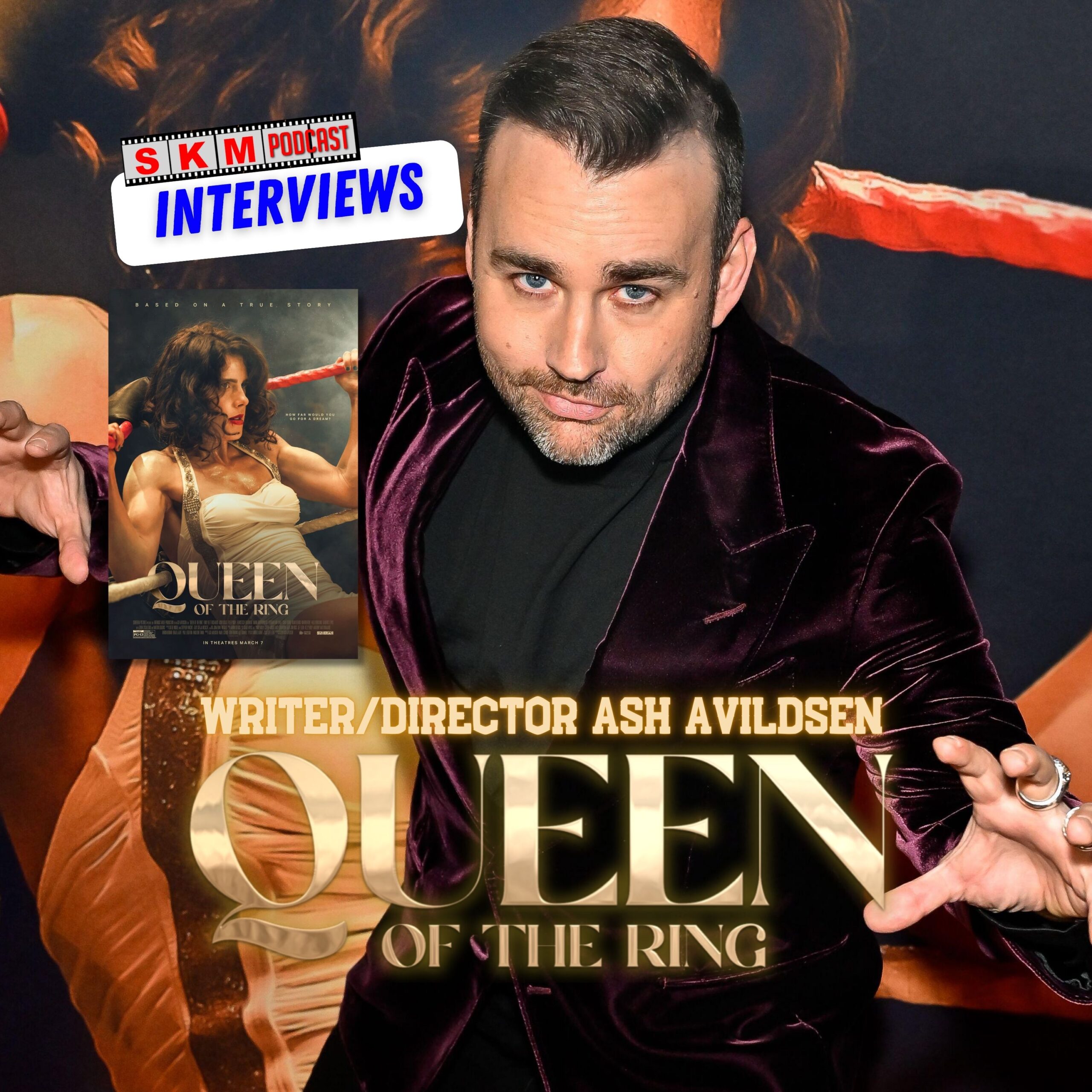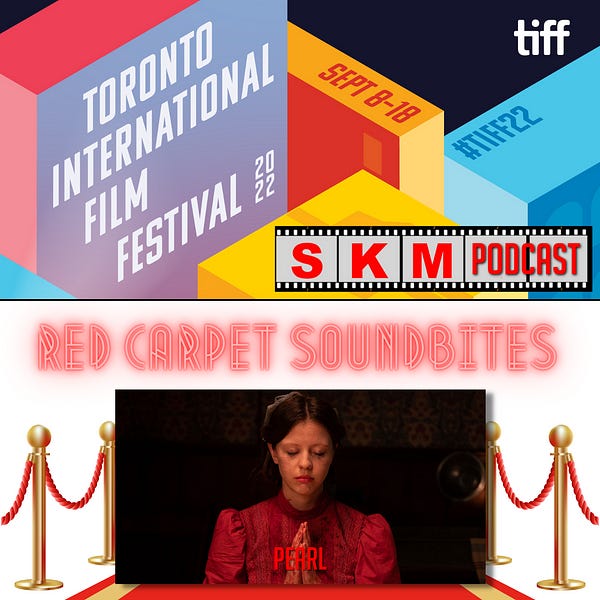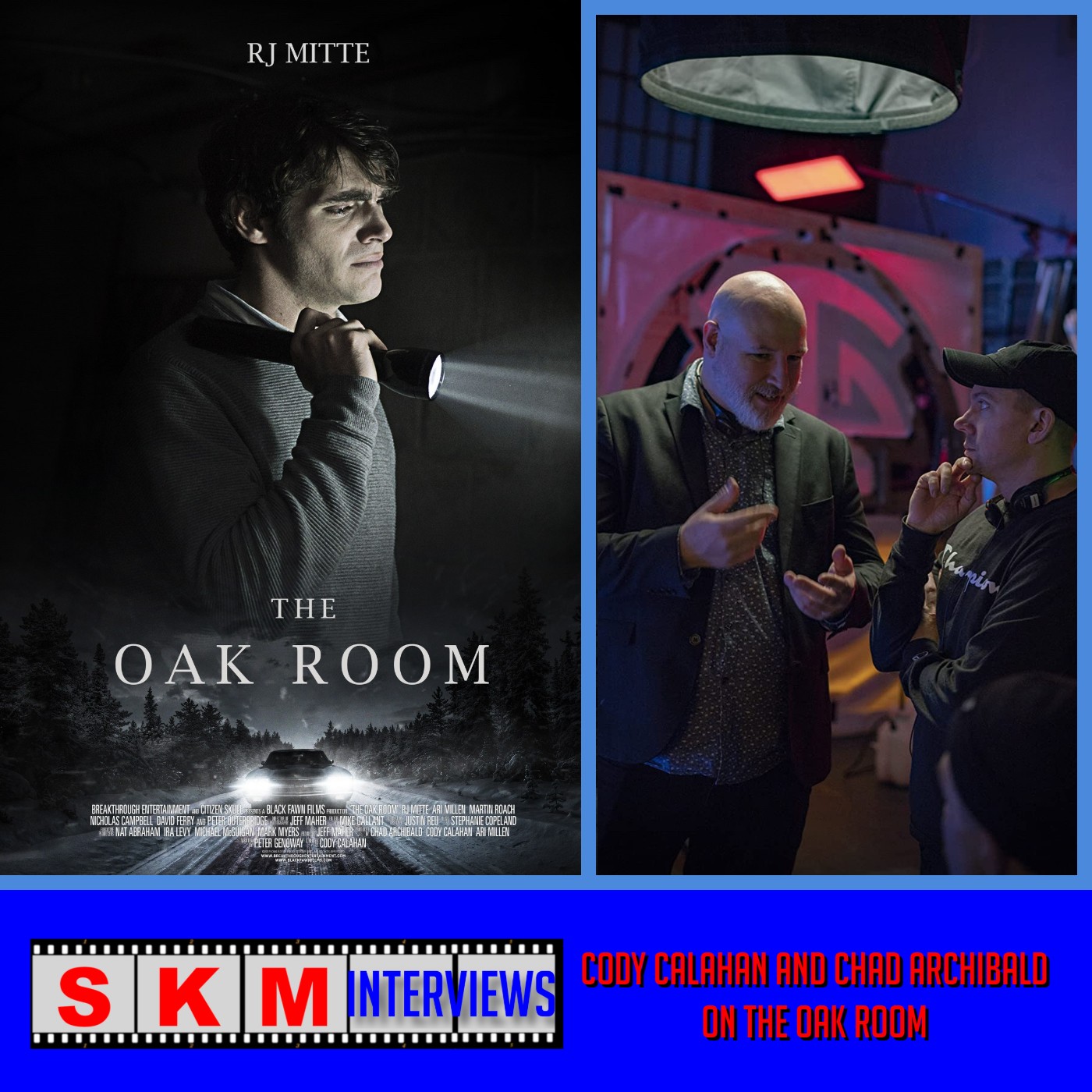Episode Transcript
[00:00:16] Speaker A: Hello and welcome to the Sean Kelly on Movies podcast. And this is the first of four interviews I conducted at the Fantasia Film Festival. I just came back from a week in Montreal, and I conducted a number of interviews with the filmmakers, and the first interview I have is actually the most recent, and that is with director Rye Levy and professional wrestlers Sonny Kiss and Perro about the documentary out in in the Ring, which had its fantasia screening last night. And it was a very good conversation, so I'll get right to it.
[00:01:04] Speaker B: Ryan, what inspired you to make this documentary?
[00:01:08] Speaker C: Well, you know, out in the ring came out came from my love of Calgary Stampede wrestling in the 1980s. It was my first experience with pro wrestling, and fandom course, started back then. And when the time came to create a feature film about pro wrestling, I decided I was going to tell it wrestling for a queer lens. And so going through a queer lens, I was able to kind of explore, you know, gender, sexuality, representation, homophobia and so much.
And that's what kind of the genesis for out in the ring was. And then slowly but surely, I would find these amazing performers like Sunny Kiss and Mike Perot and all these other people. And it became kind of a journey to build a history, some of it hidden and some of it slowly but surely out and public and embracing everything.
[00:02:06] Speaker B: So the documentary actually points out that there was always a certain homurotic element to pro wrestling. But I, there's, like, been a cognitive dissonance to it. So why would you say that?
[00:02:20] Speaker C: Well, I guess, you know, I think a lot of people, as I think Scott Sergeant Dixon McEwen says in the film so eloquently, you know, a lot of people are in denial of what's right in front of them. And clearly, you know, we see, you know, I think we can look now that, as he says, road warriors are a leatherman's fantasy. That's a tom of Finland representation.
And there's a lot of people in their underwear dance, you know, wrestling around. And, you know, there are things, you know, like people ripping each other's clothes off. You know, we use a clip of Scott Steiner basically stripping down, I believe it's Scott Steiner in that scene, stripping down triple h into his underwear in the ring. So there's all these things that we can look back that, you know, obviously are very homoerotic in representation, both male and female. And I think I, you know, I think people just, you know, don't, you know, for a segment of people, they don't see what's in front of them. I think for those who are part of the community.
Clearly, we're able to see what's going on, and I think this new generation of amazing performers is able to now be themselves in that representation. It's not just a bunch of straight, heterosexual people, you know, portraying these images.
[00:03:34] Speaker B: So. Okay, sonny, kiss. So you are actually one of the early signees to aew as kind of a sign of that company's inclusivity. So how do you feel aw has been when it comes to LGBTQ representation?
[00:03:53] Speaker D: So aw mission was always to have a product that was very inclusive, have tons of people from all walks of life.
I feel like, as far as, you know, that mission, to have that diversity, I feel like we've definitely accomplished that for sure. Like, there's. There's not just that token one. It's now we have five, six, seven of us on the roster, from referees to workers, and. Yeah, no, it's an amazing thing, for sure.
[00:04:22] Speaker B: And for pero. Sorry, I didn't have the question prepared. But, like, in the documentary, your story is actually one of the more harrowing because you mentioned actually being suicidal in the closet. So could you talk a bit about that?
[00:04:37] Speaker E: Well, unfortunately, suicide. The thought of suicide is a lot in our community, especially because we are taught that we're not supposed to be given, be authentically who we are. So I thought growing up, especially seeing nobody like me, I thought I was the only one to exist because I'll get closer for you. I grew up not seeing any representation of me on television and sports or anything, because, predominantly, you have to remember, there is no gay writers. There are straight writers that write for gay people. And I grew up not thinking anybody was like me. So you become very lonely, and you think to yourself that, unfortunately, that you're the only one. And that led to a lot of thoughts that I was gonna let people down if I was gay. So I became very lonely, and I didn't know how to tell anybody, and I decided to make the decision, and I'm happy that I didn't go through with it because shortly after, I met the love of my life, and nine years later, I married to him. So suicide is not the answer, and sometimes you have to meet everything face off.
[00:05:55] Speaker B: So I want to talk about the representation of LGBTQ in WWE, which is a big point in the film, that it's not that good.
So do you think WWE can ever truly be inclusive or will be like Darren Young and just have a gay wrestler for printhead our purposes?
[00:06:13] Speaker C: Well, I think the Darren Young story is kind of an interesting thing. Because Darren came out. Darren came out on the roster while he was already there in TMZ, and they had to kind of just address it and they addressed it poorly and they dealt with him poorly, and they made statements like, darren Young, the wrestler is not gay. Fred Rosser is gay. And as the amazing razor Clark says, the film, you know, the only person who should decide who gets to separate what from what is that individual. So any of those wrestlers, there should be no reason that a corporate entity should be able to tell you, you have to be straight on camera, and you can be gay on camera and straight in your regular life.
It's not, you know, it's not fair, first off, and it's not possible, really, in a way, because all elements of yourself should. Are facets of who you are. And so if you're out, you're out. And, you know, nobody's saying that it has to be a love story and that, you know, the performers have to fall in love with each other, sexualize. But people being themselves and being honest and open is what makes them work, and it makes those characters perform in, you know, in the best way possible. And WWE's, you know, representation at this point is, you know, it fluctuated, and it's. Right now, I mean, there's maybe five people who are out on the roster, but they're not either, not promoted. I mean, we haven't seen Shayna Baszler on tv and WWE for, I almost say, a month to two months now. And then even then, we're not seeing, you know, as many people, whereas in other organizations, even at AEW, there's work that needs to be done there in terms of elevating the talent and offering, giving those opportunities and seeing representation.
[00:08:10] Speaker B: Actually, I'll do that for a fall because. So for Sonny is, like, most of Sonny kisses matches in AEW has been on, like, AEW, dark instead of dynamite. So are you, like, disappointed not to be on tv as often as you'd hope?
[00:08:27] Speaker D: Oh, well, of course. I mean, why? Are you sweet on the spot? Yeah, no, I definitely think about it. You know, I got into wrestling because I wanted to be featured in some sort of way, you know, in it. And, yeah, no, it's definitely. It's an interesting situation because, you know, you just. You think about it in ways that are like, is it me? Is it me?
We have a stacked roster. There's over 100 something people on the roster, and we're all. There's a lot of different LGBTQ workers that are being dealt with differently. So I want to say that, to add to what you were saying, you know, everyone's having their own different experiences, and we don't want to speak for everybody, but I'll say it's definitely been challenging, for sure.
But I'm just going to keep going, you know, that's the only thing I can do.
I'm here to say, can I answer that conversation?
[00:09:19] Speaker E: We have, unfortunately, and I'm going to be truthful. We have a huge problem in wrestling. We have a huge problem, and it's not just wrestling, because wrestling mimics life. And right now, we have a large hatred towards the LGBTQ community, whether it was a pandemic or what happened, but we have this big conservative movement where all of a sudden, religion and all that played effect into what is shown on television also, I don't understand why we have to be treated separately from our straight counterparts, whereas they could be straight on television. That's already inherent, that they can have a love interest, they can cheat on their husband, they can do whatever they want on television, on camera and have that storyline. But anytime we're not allowed to address any storyline to us, and we're. We're right at the. The problem is, I call it the, unfortunately, the token gay stage, where they want us on the roster, but they don't know how to use us because nobody's ever. They don't know anything about us because they never asked. We don't have gay story writers. We do not have anybody to address our issues or give. They don't even ask us for our ideas of how can we address this and coming off non homophobic, because the biggest fear now, unfortunately, with all of television is the generation above us that is writing. The television is afraid of the cancel culture, so they're afraid that anything they do, they're gonna get canceled for it. So rather than trying it, because wrestling used to be.
What was the forward thinking?
You know, we mimic life, and we did things before other people. So, like Star Trek. Star Trek had everybody from everywhere shaped their life. And when it happened, people were like, oh, my God, that could never happen. But slowly, over time, people became okay. I see this because we are what children, the generation coming up watching television now are okay with LGBTQ. They're okay. They understand clothes don't have a gender that. But we're still stuck in this over emasculated era of, oh, this has to be this way. Nobody wants to take a risk. Nobody wants to put a new idea. Wrestling, unfortunately, right now, is stale. I don't want to see another nineties 98 wrestler out there. I unfortunately don't. I love Ric flair. I love those matches. I don't want to see the last one because the last one, to me, was in the wrestling ring with Shawn Michaels. That, to me, is one of those things where there's a lot of older wrestlers taking away right now from younger wrestlers with different ideas. And that's what wrestling used to be about. It used to be pushing the boundaries, showing where we can go. But right now, we're stuck in this. Let's redo something we've done over and over and over again. And they don't understand why viewers in this generation that don't tune into tv because they don't have cable that watch it on television are watching the sunny kisses on a dark. And. And sometimes I do think Sunny's on dark because Sunny gets views. People watch that, and they have no idea how to generate that with all other people on that roster on that show. And that's just my personal opinion. But I know for me right now, what I've learned from the straight community is that they love to put things in boxes, and it has. Has to fit in that box, and if it doesn't fit in the box, it makes them uncomfortable. And so explaining to them that I'm a masculine gay man, and then there's feminine gay, and then there's this gay, and then there's. There's trans, and then there's trans. And they don't understand that. But we understand that the younger generation understands that. A whole group of people, a generation of fans that feel for goddess. We do a show called Big Gay Brunch.
All LGBTQ fans living their best life. That's what wrestling is about, showing that you're not forgotten. RuPaul's drag race is one of the most watched shows, not by gay people, by straight people.
So they're interested. Fans are interested. It's just the people running it right now are afraid to take the chance because they're so afraid to make a misstep. And I will say this, that was the one good thing Vince did in the past, before the older generations, is he took risks. There's nobody. There's no promoter out there taking risks. In fact, they're just redoing WWE stuff with WWE guys.
So that's. That's my opinion on wrestling right now. Whether it's wrong or right, we're all tight. Like, that's. You know, it is. But unfortunately, like, we're at this period now where there. There's more of us there's not just sunny, it's not just me. It's not just effy. It's not just dark chic. It's not just Danny. There's so many young LGBTQ wrestlers that are so talented, it's so gifted that they're, they're a wrestler. It's not. I'm like, why, why do we have to separate them being straight and us being gay when they can do whatever they want, but we can't speak up and just say, hey, can we just try this, see what happens? And if it doesn't work, it doesn't work. That's okay, because you try a lot of stuff with your straight counterparts that don't work at all and are abandoned immediately. But why can't we at least try? What's, what's, my question is, to our straight counterparts, what is it going to hurt? What are you going to lose? What is, what is three weeks of television going to hurt because you do it every, every other week with other, other people. What's the difference? And that's my question right now.
[00:15:06] Speaker C: And I mean, to add to that point, I mean, you talked about, you know, again, sunny getting views online, and that might be a reason. The truth is, is that most people who are consuming wrestling are, or consuming it online. They don't have cable. They're not watching tv tapings. I'm certainly not watching Raw and SmackDown on Monday night because, one, it's 3 hours of talking mostly, and we don't get enough wrestling. I'm a wrestling fan. I'm not a speech fan. I don't need the best of WWE promos, volume, whatever.
I want to watch wrestling. People are turning to fight tv and IWTV to consume wrestling and they're consuming dark and they're watching it and they're watching. A lot of the matches are being put online instantly after the tv shows. So again, you know, the way fans are consuming wrestling is different. And the truth is that the tv model is antiquated. And I wonder how much of it. Again, it's driven by corporations, it's driven by, especially WBE, driven by a publicly traded company. It's driven by, you know, by sales of stocks and network, you know, network numbers. And again, you know, it's, you know, wrestling has to evolve with the times and the access to these amazing performers like Mike and Sonny has got to happen through that and hopefully they'll be able to lead the charge to change it. And then at some point maybe we'll actually get some representation behind the scenes that is going to advocate for those performers and write for them and collaborate with the performers themselves, which is essentially what needs to happen.
[00:16:51] Speaker B: Okay, I think that's a good put to end on.
The Sean Canada Movies podcast is a production of Skrmovies.com. episodes and show notes can be found at Skrmovies podcast CA or Skrmruvies substack.com and subscribe V two s via Spotify, Apple Podcasts, Google Podcast, and where else podcasts are hosted. Support us by becoming a paid subscriber at skrmovies substack.com YouTube.


